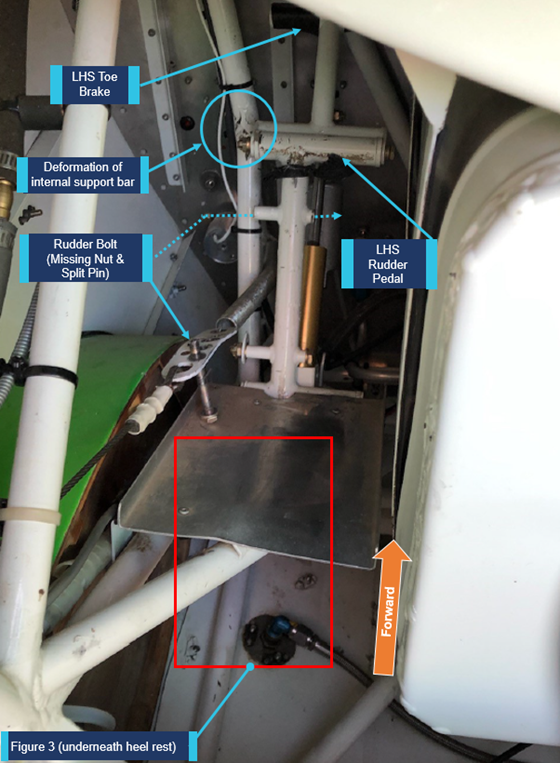| Occurrence Briefs are concise reports that detail the facts surrounding a transport safety occurrence, as received in the initial notification and any follow-up enquiries. They provide an opportunity to share safety messages in the absence of an investigation. |
What happened
On the afternoon of 30 July 2019, a local pilot and owner of a DR-107 One Design amateur-built aircraft[1] commenced flying activities at Narromine Airport, New South Wales. At about 1415 Eastern Standard Time, while conducting aerobatics, the pilot experienced degraded rudder control. The pilot elected to land immediately on runway 22. On landing, the left rudder pedal/cable mechanism collapsed, the aircraft veered to the right of the runway and ground looped,[2] colliding with a nearby gable marker. The pilot sustained minor injuries, and the aircraft was substantially damaged.
Post-Accident Inspection
Immediately following the accident, the aircraft owner conducted a detailed inspection of the left rudder pedal assembly, including the rudder cable, pedal and the surrounding areas for damage. The pilot discovered that the nut and bolt (with split pin) fastener, connecting the left rudder pedal to the rudder cable, had failed (Figure 1). The left rudder pedal was extended to the maximum forward position (Figure 2). The subsequent walk-around inspection identified additional external damage to the lower side of the forward fuselage, the left-wing tip and the left landing gear.
Figure 1: Left rudder pedal assembly – looking forward

Source: Aircraft owner & pilot
Figure 2: Expanded view – underneath left-hand side heel/foot rest

Source: Aircraft owner & pilot
Safety message
In this incident, the pilot recognised a potential flight control failure while inflight, and successfully recovered the aircraft to the ground as soon as he was able. Aerobatic flying can produce significant stress to flight control mechanisms. This occurrence reinforces the need to complete a diligent pre-flight inspection of all visible flight control components/attachment points, and to act promptly, yet conservatively in the event of any flight control malfunction.
About this report
Decisions regarding whether to conduct an investigation, and the scope of an investigation, are based on many factors, including the level of safety benefit likely to be obtained from an investigation. For this occurrence, no investigation has been conducted and the ATSB did not verify the accuracy of the information. A brief description has been written using information supplied in the notification and any follow-up information in order to produce a short summary report, and allow for greater industry awareness of potential safety issues and possible safety actions.
__________
- Amateur-built aircraft: an aircraft, the major portion of which; has been fabricated and assembled by a person, or persons who undertook the construction project solely for their own education or recreation.
- Ground-loop: a violent, uncontrolled horizontal rotation of an aircraft while landing, taking off, or taxiing.


